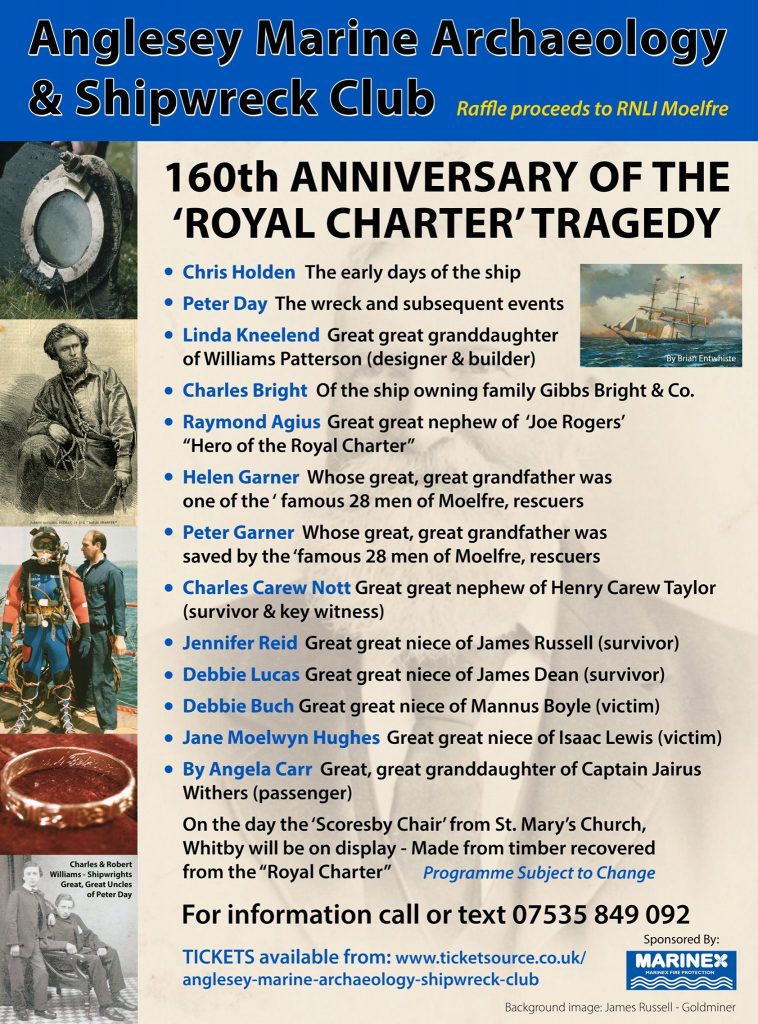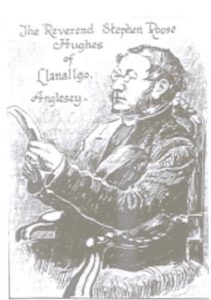160th Anniversary of the ‘Royal Charter’ Tragedy

I recently attended a full day event marking the tragic “golden wreck” of the Royal Charter, bringing miners and gold bullion back from Australia.
Divers, historians, affected families and local residents gathered in Moelfre village hall on a prophetically stormy Saturday, regaled by stories of victims, survivors, treasure hunters, ship builders … starting with a recorded interview with Charles Bright and me (Mike Gibbs) of how our families came to own this fine ship that ran the fastest journeys between Melbourne and Liverpool.
I walked the coastal path to the clifftop memorial stone, followed by the local St. Gallgo church where many were buried, and a welsh male choir was recording.

The previous evening I had attended “a dramatic monologue based on the sermon given by Revd. Stephen Roose Hughes, Rector of St. Gallgo’s Church, following the “Royal Charter” tragedy of 1859.
A very moving weekend; the memory of the infamous wreck, still very much alive in Anglesey history, probably even more so as people increasingly trace their ancestors and family history, and divers still occasionally bring up gold nuggets from the rocky crevices. The ship was built on the River Dee outside Chester and based out of Liverpool. The disaster led to founding of the shipping forecast and weather warnings and contributed to the eventual acquisition of the firm Gibbs, Bright & Co. by Antony Gibbs & Sons, who retained the name for Australian operations.
There are many web references to the wreck on the Royal Charter as well as several ballads and songs, both contemporary and modern, referring to this perhaps the most famous of British maritime shipwrecks. Charles Dickens had family connections to the Revd. visited the Moelfre a few days after the incident and wrote a short story, “The Shipwreck”.
- Wikipedia – Royal Charter Ship
- Anglesey History – Sinking of the Royal Charter
- People’s Collection Wales – ROYAL CHARTER: Profit and Loss for Gibbs, Bright & Co
- BBC News – Britain’s largest gold nugget found off Anglesey coast
Watch this YouTube folk song about Issac Lewis who drowned within sight of home, while his father was one of the Moelfre rescuers.
The Loss of the Royal Charter – A popular ballad of the time
Come all you tender Christians,
And hear my mournful theme:
While I relate the hardships great,
Upon the watery main.
The Steam Ship Royal Charter,
From Australia she set sail,
In hopes to reach old England
With a sweet and pleasant gale.
We had Five Hundred souls on board,
Both passengers and crew:
But when we reached the Welsh coast,
A dreadful storm it blew.
Until the dreadful wreck took place,
With raging seas all round;
Four Hundred and Seventy souls went down
And was in the ocean drowned.
The most of these were emigrants,
As you may understand;
Returning to old England
From Australia’s golden land,
In hoped to live in happiness,
After being so long away.
The beat their course to Liverpool,
Upon that fatal day.
When the Royal Charter struck the rock,
We’re lost! the people cried;
The masts and rigging were cut down,
And fell into the tide.
The mothers to their children clung,
Saying we may rue the day
We sailed from Australia,
To die in Moelfra Bay.
The cries of these poor passengers,
Would pierce your heart with grief;
Shrieking on the sinking ship,
And calling for relief.
The boats that some of them might save,
They were all washed away;
So with a shriek they all went down
Beneath the watery wave.
The gallant ship Royal Charter,
Off the Welsh coast it went down;
Captain Taylor did his best,
Likewise his gallant men,
To save them from the raging sea,
Where many suffered sore;
God help their friends and kindred,
They’ll never see them more.
